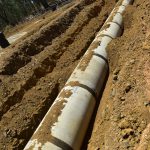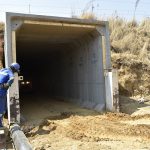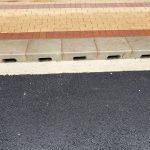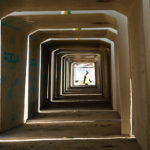Since ROCLA commenced local manufacture of specialised concrete cabins destined for local photovoltaic (PV) farms in July, they have delivered 23 concrete cabins to PV farm clients as at end -August 2013. The concrete cabins are destined for two sites with each site requiring 64 concrete cabins. Completion of delivery is due by end- January 2014.
ROCLA, Sales Engineer, Justin Kretzmar said “We are currently manufacturing five to six cabins per week and we are confident of meeting our deadline for project completion in January 2014. We have further potential orders in the pipeline and are very optimistic of followon business. Our goal is that this concrete cabin technology and processes will become the industry standard for all alternate energyfacilities in South Africa.”
Each completed cabin, including all electrical items, as loaded for dispatch, has an approximate mass of 38 tons, requiring abnormal load transportation requirements with special stepdeck trailers with 4 x axles and smaller, higher load capacity wheels to transport the cabins safely over the long distance required.
ROCLA entered into a manufacture-under-licence agreement with the Spanish company Prephor to manufacture these cabins to service the growing PV farm sector in South Africa. They offer a durable solution with advanced security and safety features in order to house the intricate and expensive electrical components required for such PV farms.
The turnaround time for each cabin is approximately 10 working days from production to delivery, with cabins having a damp proof undercoat as well as a textured finish coat. One of the challenges faced by ROCLA was to ensure that the concrete quality and consistency for each cabin was up to international standards and maintained as such. ROCLA needed to achieve an exceptionally smooth concrete finish quality with very high early strength requirements. Establishing the perfect balance between accelerators and self-consolidating concrete additives gave them a mix design that was robust, consistent and required no vibration during placement. The cabin shell forms the largest single component with almost 8m3 of concrete and a mass of 19 tons – equivalent to nine Land Rover Discoveries – “that is a lot of concrete to waste so we had to achieve the perfection that has been obtained” said Kretzmar. “During the initial concrete casting stage ROCLA was faced with three major quality challenges, namely: concrete pull-outs, blowholes and pinholes. Research showed that different mould release agents were able to eliminate the bulk of blowholes and pinholes, and with careful attention to corner details on the mould, pull-outs were alsoprevented” said Jason Roberts, ROCLA Civil Technologist.
Kretzmar added “The complete process from mould to trailer is a seamless operation. Due to the electrical installations required inside the cabin it was essential that we project managed the process carefully to ensure that the production flow was not interrupted and uptime optimised.”
The complexities of the electrical installations to be housed are highlighted by the fact that ROCLA had to source 120 new stock items to include in their inventory for the concrete cabin project. The cabins themselves had to offer considerable storage space and ventilation for the temperature sensors, hygrometers, transfer switches, db boards, inverters, transformers and associated switchgear, most of which were imported. Andries Jansen van Vuuren of Xtreme Electrical, ROCLA’s electrical contractor commented “Each cabin required four days for: electrical installation, testing, certification and finally the sign-off for the completed electrical works. Considering that the schedule for completion is six cabins per week, it initially posed an enormous challenge until the processes became streamlined, enabling the installations to become a smooth production flow”. “We use approximately 1,000 m of cable per cabin – enough cable to wrap completely around the cabin almost 45 times. Aberdare Cables has been able to meet the very tight delivery schedules ensuring that all cables installed were sourced locally in SA” said van Vuuren.
The electrical design and installation is fully compliant with South African legislation. ROCLA completely renovated one of their existing production areas at their Roodepoort Factory to produce, cure, de-mould, paint and fit each cabin in one area, without having to unnecessarily move these items around. In addition, an extra 25 tonne gantry crane was sourced to increase their total lifting capacity in this area from 25t to 50t. The concrete cabins are durable, safe and offered in varying lengths, with the width and height as a fixed dimension. All openings for doors, ventilation grilles and fans are customisable to suit each specific client.







